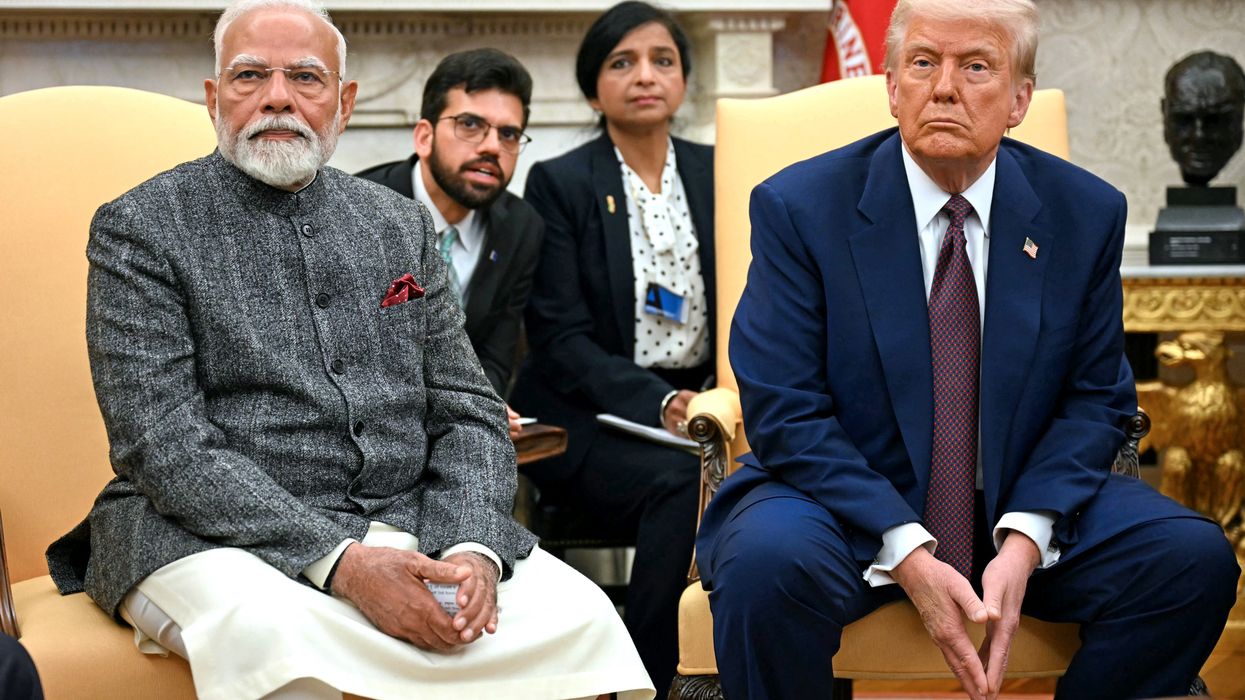INDIAN exporters on Thursday warned that additional US tariffs could render many businesses "not viable" after president Donald Trump ordered a steep hike in levies on Indian goods over New Delhi’s purchase of Russian oil.
Stocks opened slightly lower, with the benchmark Nifty index falling 0.31 per cent after the initial 25 per cent US tariff came into effect. The levy is set to double to 50 per cent from August 28, following Trump’s order on Wednesday penalising India’s continued imports of Russian oil.
India is the second-largest buyer of Russian crude, benefiting from discounts amid Western sanctions. The US move is aimed at cutting Moscow’s oil revenue, which is used to fund the war in Ukraine.
India’s foreign ministry called the new US tariffs “unfair, unjustified and unreasonable.”
Exporters fear impact
SC Ralhan, president of the Federation of Indian Export Organisations (FIEO), said the decision would significantly affect trade.
"This move is a severe setback for Indian exports, with nearly 55 per cent of our shipments to the US market directly affected," he said in a statement.
"The 50 per cent reciprocal tariff effectively imposes a cost burden, placing our exporters at a 30–35 per cent competitive disadvantage compared to peers from countries with lesser reciprocal tariff."
Ralhan added that "many export orders have already been put on hold" as buyers reconsider sourcing.
For many small to medium-sized businesses, margins are already thin, he said. "Absorbing this sudden cost escalation is simply not viable."
Tariff could hit growth
The US is India’s largest trading partner, with exports to the country amounting to $87.4 billion in 2024.
"If the extra 25 per cent tariff that president Trump has announced on imports from India remains in place, India’s attractiveness as an emerging manufacturing hub will be hugely undermined," said Shilan Shah of Capital Economics.
Shah said US spending supports around 2.5 per cent of India’s GDP. He added that a 50 per cent tariff is "large enough to have a material impact", potentially reducing economic growth to closer to six per cent this year and next, down from the current forecast of seven per cent.
Modi says farmers’ interests come first
prime minister Narendra Modi, responding publicly for the first time, said India would not compromise the interests of its farmers.
"For us, our farmers' welfare is supreme," Modi said at an event in New Delhi. "India will never compromise on the wellbeing of its farmers, dairy (sector) and fishermen. And I know personally I will have to pay a heavy price for it."
While Modi did not directly name the US or mention the stalled trade talks, his comments were seen as a defence of India's position.
Trade negotiations between the two countries broke down after five rounds, mainly over India’s reluctance to open up its farm and dairy sectors and its continued purchase of Russian oil.
The Indian foreign ministry described the US move as “extremely unfortunate” and said it would “take all necessary steps to protect its national interests.”
India calls US move illogical
Dammu Ravi, secretary of economic relations in India’s foreign ministry, said the US decision lacked justification.
"The US tariff hike lacks logic," Ravi told reporters.
"This is a temporary aberration, a temporary problem that the country will face, but in course of time, we are confident that the world will find solutions."
New diplomatic efforts
India is already signalling a possible shift in diplomatic strategy. Modi is planning his first visit to China in over seven years, which may indicate a reassessment of global alignments.
Brazilian president Luiz Inacio Lula da Silva said on Wednesday that he would initiate a BRICS-level discussion on how to address the tariffs. He said he planned to call both Modi and China’s Xi Jinping. The BRICS group also includes Russia and South Africa.
India’s Ravi added that "like-minded countries will look for cooperation and economic engagement that will be mutually beneficial to all sides."
Political and industry response
Modi is facing growing calls to respond firmly to the US decision, with both his supporters and opposition leaders urging a strong reaction.
"India's national interest is supreme. Any nation that arbitrarily penalises India for its time-tested policy of strategic autonomy, rooted in the ideology of non-alignment, does not understand the steel frame India is made of," said Congress party president Mallikarjun Kharge.
Industry groups also voiced concern. Sudhir Sekhri, chairman of the Apparel Export Promotion Council, said: "There is no way the industry can absorb such a steep hike." He called for fiscal support from the government.
Reliance Industries, led by Mukesh Ambani, said in its annual report that ongoing geopolitical and tariff-related uncertainties could affect trade flows and the demand-supply balance.
India's equity market fell another 0.5 per cent on Thursday, hitting a three-month low. The muted reaction reflected investor expectations that the tariffs could still be negotiated down.
(With inputs from agencies)




